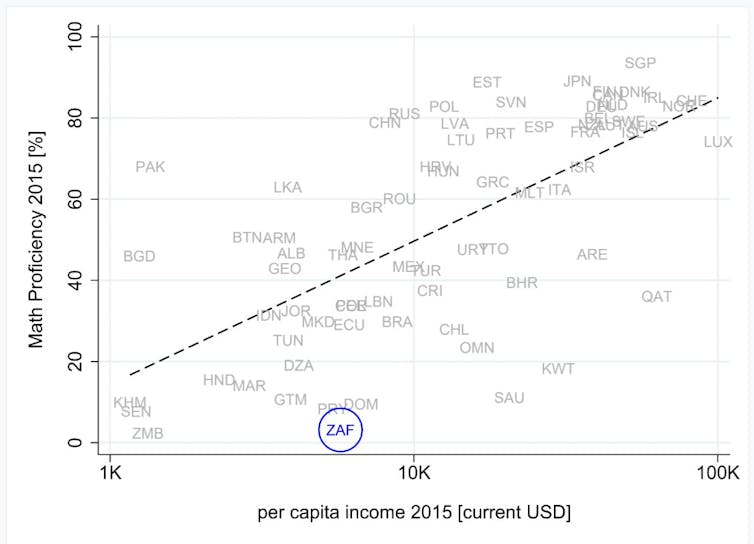![]() South Africa’s economy has consistently been a two-speed economy. It has one of the highest inequality rates in the world, characterised by gaps in opportunities for its citizens and by severe poverty lasting from one generation to the next.
South Africa’s economy has consistently been a two-speed economy. It has one of the highest inequality rates in the world, characterised by gaps in opportunities for its citizens and by severe poverty lasting from one generation to the next.
In the middle of a global pandemic, the debate is about handling COVID-19 while saving the economy, and less about promoting fast growth and future prosperity. Yet this is an unfair dilemma. Countries in good shape can more easily handle the costs of COVID-19. We see the pandemic as just one more factor intensifying the differences.
In that context, the pessimistic outlook for future economic growth is worrisome. What performance can we expect from a country with South Africa’s income level in these challenging global economic conditions?
South Africa’s economic growth trajectory from 1990 to 2018 shows two things: persistent income inequality between countries; and a fall in the country’s world ranking from number 80 in the 1990s to 110-120 in the 2010s.
If global economic conditions hurt every country’s economy, why has South Africa performed poorly relative to its peers?
History does not support the concept of catching up. Poor countries stay poor, rich countries stay rich, and middle incomes also stay put, unless radical structural changes take place. The central message from empirical economics is that inequality continues both between countries and between households within countries. Poverty traps are observed in most developing countries as one generation’s lack of opportunities constrains the next generation.
Increasing investment in capital and human capital is good for economic growth. Low- and middle-income countries stay behind in such investments, not only for lack of funding, but also for lack of expectations.
Expectations in the classroom drive academic outcomes. The attitudes in society at large, meaning how much effort is expected from its members in aiming at better outcomes, do matter for economic growth. Traits such as expectations are not easily observable at the level of families or countries, but are an important determinant.
To lift its poorest citizens out of poverty, South Africa must to do better than it has in the past. It must not be reluctant to compare itself with countries with higher income levels and take their paths as examples, instead of merely accepting the comparison to countries with equal income levels.
Two dimensions to education
There are two dimensions to education. First, its quantity, as measured by the years of schooling, or enrolment rates at various grades. Relative to other middle-income countries, South Africa performs well on enrolment rates. In 2017, the secondary enrolment rate relative to the country’s per capita income was above the world average.
The second is the quality of schooling, as measured by student test scores on science, mathematics and reading. American economist Robert Barro shows that, all other things equal, if the population receives one extra year of schooling this is associated with about 0.4% extra annual growth. When it comes to quality, a 10% higher score on science and maths implies a 1% higher growth rate.
But when students attend school in large numbers, they do not learn much. Maths proficiency, as one measure of quality, is virtually absent in South Africa, while the typical peer country of equal income achieves a 40% score.
Recently, the Department of Basic Education has revealed a 16% decline in the number of secondary school students taking mathematics from 263,903 in 2015 to 222,034 in 2019. Of those who took the subject in 2019, only 121,179 passed it.
Maths matters for economic growth. A concerted effort to raise educational quality is an almost sure medication for better economic performance.

Figure 1. Per capita income and mathematics proficiency, 2015
Educational quality explains growth
The graph we have used with this article shows correlations, but not causality. We are therefore cautious about translating these findings into simple policy advice. Yet, for education the literature has found substantial evidence. It concludes that educational quality explains growth.
Indeed, immigrants who come from countries with better education tend to earn higher incomes. Countries that improve their educational quality show increasing economic growth as well, compared to countries that do not improve.
The literature also refers to lower unemployment levels among those with higher levels of education. The latest data on shares of employment and unemployment within the same education group level for the fourth quarter of 2019 provides more evidence. Completing secondary education increases the probability of being employed from 32.2% with some level of primary education or enrolment in secondary education to 48.9%. Of those with tertiary education, 73.9% were employed. Good public education also improves social cohesion, which is a pillar of economic success.
Based on a shared finding in the empirical growth literature, when countries copy the effort of richer countries, they move towards their high-income peers at a speed of 2% per year.
If South Africa aims to catch up with a country with double its income, it needs to invest in education, capital, good institutions and social capital to ensure extra annual growth of 2%. If the country had achieved that much more growth since 1994, the average income per person would be 60% higher than it is now. Such is the power of cumulative growth.
What needs to be done
South Africa must make the effort that is typical for high-income countries, if it wants to become one of those high-income countries. It must not only aim at outperforming economies of similar income levels. Its policies should focus on creating an environment supportive to economic growth.
Improving the quantity and quality of education can also pay off for individuals as their employability and incomes improve.
Such an improvement is not easy to achieve. It certainly is not a quick fix to be used by politicians for short-term gains. And economic growth takes more than education. Government must also improve the quality of institutions, reduce corruption and promote social cohesion.
This is easier said than done. It needs a long-term vision, determination and the will by politicians, policymakers, and voters to make the necessary changes.
Written by Roula Inglesi-Lotz, Associate Professor of Economics, University of Pretoria and Reyer Gerlagh, Invited User, Tilburg University
This article is republished from The Conversation under a Creative Commons license. Read the original article.
EMAIL THIS ARTICLE SAVE THIS ARTICLE ARTICLE ENQUIRY
To subscribe email subscriptions@creamermedia.co.za or click here
To advertise email advertising@creamermedia.co.za or click here











